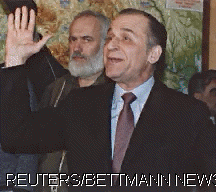
Iliescu, Ion (1930- ), Romanian statesman, born in Oltenita and educated at Bucharest Polytechnic Institute and Moscow State University. Iliescu joined the Union of Communist Youth in 1944, long before the Communist Party was popular in Romania. Trained in electrotechnical engineering and business administration, he made his career within the party apparatus. He became secretary of the Central Committee of the Union of Communist Youth in 1956 and a candidate member of the Central Committee in 1965.
After Nicolae Ceausescu became party head, Iliescu experienced both the advancement granted to Ceausescu's favorites and the subsequent dilution of power Ceausescu imposed on those he feared. Iliescu successively became first secretary of the Central Committee of the Union of Communist Youth and minister of Youth Problems (1967) and a full member of the Central Committee (1968). In 1971, however, he was deprived of all his positions except membership in the Central Committee and was assigned to serve as regional party secretary in Timisoara. In 1974 he assumed the same post in Iasi.
Iliescu became part of the group of formerly high-ranking officials disaffected with the Ceausescu regime. Opposition action came to a head in 1989 when a riot in Bucharest escalated, and Ceausescu was deposed and executed. Iliescu immediately took charge, assuming leadership of the Democratic National Salvation Front, the provisional government. In May 1990 he received 85 percent of the vote for president of Romania in the first free elections held since the 1930s. Although Iliescu resorted to harsh measures to quell an uprising following the election, he remained in power to oversee the country's slow and uneven transition to parliamentary democracy.
In a 1992 runoff election, Iliescu was reelected with 61 percent of the vote. He promised to continue market reforms, but at a slower pace; this action caused others, especially the United States, to question his commitment to democracy. It came at a time when unemployment had reached 9 percent, health workers were striking for higher wages, and gasoline prices were rising.
